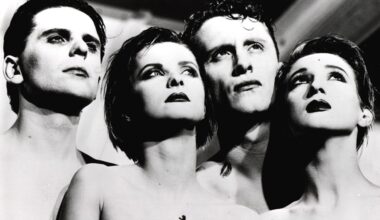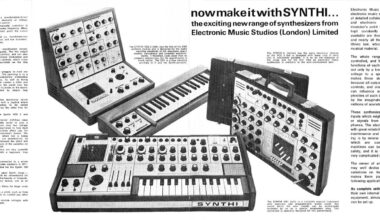Meat Beat Manifesto Big chief Jack Dangers takes us on a ride through his Swindon years, being XTC’s teaboy, his British Rail-funded debut LP all the way to his recent release, ‘Impossible Star’
What did you get up to this New Year’s Eve? Meat Beat Manifesto’s Jack Dangers had friends over for a few drinks and a quick spin on the Technics, as you do. Only in this case, among those queuing up for their turn on the old wheels of steel included none other than DJ Shadow and fellow Bay Area hip hop legend Cut Chemist.
Shadow, or Josh, as Jack calls him, also visited recently to pick up a couple of thousand records that were languishing, relatively unused, in the garage of Jack’s house.
“He started looking through them to see which ones he wanted,” says Jack down the line, from his home north of the Golden Gate Bridge. “In the end I was like, ‘Why don’t you just take them all for a dollar each?’.”
Jack built up his vast collection relatively quickly, having moved to San Francisco from his native Swindon in the pre-internet early 90s and became immersed in the city’s then rather massive array of second-hand record stores. But he doesn’t see himself in the same crate digging league as the likes of Shadow, who know exactly what they’re after.
“I was looking for samples,” he says, “I’d pick something because the cover or the title looked interesting, and then just end up enjoying the music.”
These days, however, you’re less likely to find Jack rummaging through the record shops or, despite what his turntablist Hogmanay may lead you to believe, hanging out with the city’s DJ royalty. In a bid to discover more about what he gets up to when he isn’t working, we suggest that San Francisco is quite a social place to live…
“It is, but I’m not,” he replies. “Where I’m speaking to you from is on a mountain and I keep meaning to get out on there a bit more, but most of the time I’m cocooning myself in the studio.”
So while to the untrained eye, Jack’s life might seem a million miles from his formative years in Swindon, he feels there are definite parallels between then and now. He laughs when telling us about one of his first proper jobs, sweeping up on Swindon train station.
“It was like the 1930s,” he recalls, “it seemed like there was a tea break every 20 minutes.”
One of his favourite activities was to find a store room in some less-explored corner of the station, and, after a heavy night in the pub, climb into a meal cage used for transporting luggage, pull over a tarpaulin and catch up on some much needed sleep. He was discovered only once, by a security guard who was very apologetic for disturbing him. There are times now, he feels, that losing himself for hours in the studio is “a bit like being under that tarpaulin, waiting for my wife to come and find me!”.

He says that those days back at Swindon station couldn’t last and indeed privatisation came along and swept away such luxurious inefficiencies. But luckily for us, not before he was able to record Meat Beat Manifesto’s 1989 debut album, ‘Storm The Studio’, which was, it seems, partially funded by British Rail.
“I’d clock in first thing in the morning,” he remembers, “and then there was a secret tunnel – this sounds like something out of Colditz – that went from the station and came out in a field on the other side. I had a mate who would clock me out at the end of the day, so I’d go to the studio.”
Some two and a half decades in California, interestingly enough, doesn’t appear to have changed his accent one iota. It’s easy to forget, when he’s telling tales of driving up to the stone circle at Avebury for a sneaky spliff with his mates, or over to Bristol (“there was absolutely nothing going on there back then”), that he’s spent more than half his life on the other side of the planet, thousands of miles from Wiltshire.
“Most people can figure it out,” he says, “but I do sometimes get asked if I’m Australian.”
It’s fascinating to note that while in Swindon, he did cross paths with arguably the city’s most famous musical products, experimental post-punks, XTC. A chance meeting at a synthesiser shop got him and a pal invited to hang out at the studio where XTC were recording. That led to an unofficial position for Jack making tea and operating tapes in the studio complex. When XTC used the studios in preparation for the tour promoting their ‘English Settlement’ album, to the amazement of Jack who was, by his own admission, a “spotty-faced little kid”, they were happy to let him sit in as they rehearsed for what would be their last proper tour.
“I sat on a flight case pretending to read a newspaper, but utterly not reading it,” he laughs. “I was watching everything going on. One day Andy Partridge noticed that I was wearing a Throbbing Gristle T-shirt. I asked him, ‘Do you like Throbbing Gristle?’ and he said, ‘I don’t like the music, but I like the idea’. That was good enough me for me; I was impressed that he liked the idea!”
Partridge would go on to produce a track called ‘Beehead’, by Jack’s first band, Perennial Divide, in 1986. He remembers being shown numerous production tricks that have remained in his arsenal ever since, including what sounds like a complicated system of reversing and re-reversing multi-track tapes to create the psychedelic trademark of “reverse reverb” – where the reverb precedes the sound, rather than coming after it.
It was a technique that he’d been taught by Hugh Padgham who worked with everyone from The Human League to Genesis, the Bee Gees and Paul McCartney.
“So there was an element of it being passed down the generations,” says Jack.
Presumably, we joke, you can just get an app for that now.
“No,” he says, carefully considering whether it might be possible, “I don’t think you’d ever be able to do that with an app.”
Those early experiments were emerging at a time when very few British acts had caught on to the idea of making electronic music.
“Back then, 30 years ago, there was only really us and Coldcut and Renegade Soundwave,” offers Jack.

He sees On-U Sound legend Adrian Sherwood as the forerunner and inspirational pioneer of that whole scene, which eventually mushroomed and dominated the late 80s and early 90s.
“He did a lot of stuff up at Southern Studios,” remembers Jack, who still has one particularly exclusive souvenir from a visit to the label’s London base. “Jah Wobble had been in, and he still worked on the London Underground at the time. He’d left his hat badge with his name on there and I’ve still got it. I guess he was a bit of a trainspotter for real in those days.”
From his earlier, more industrial-edged tunes through to massive-selling singles like ‘Radio Babylon’ in 1990 (which paved the way for breakbeat and jungle) and the Orbital-remixed ‘Mindstream’, Jack has never rested on one style for too long. He moved on to more experimental, listening-based albums like 1996’s, ‘Subliminal Sandwich’, left-field jazz on ‘At The Center’, and a reinvented dubstep vibe on ‘Autoimmune’, for Mike Paradinas’ Planet Mu label.
His latest offering, ‘Impossible Star’ arrives some eight years on from his last album proper, 2010’s ‘Answers Come In Dreams’. Some of that stretch of time between releases was taken up putting together audiovisual project, ‘The Forger’, which utilises many of the samples that Jack has used in sonic form in the past.
Because a good number of those samples were originally culled from video tapes, he felt he had to transform them into audiovisual form before being able to move on. While acknowledging he has spent a considerable amount of time “for free”, he justifies it because “it was just something I had to do, to get out of me”.
When that project was completed, he went on to record around 30 tracks for ‘Impossible Star’, but quickly rejected the idea of a sprawling double or triple album, ultimately editing the results down into what more closely resembles a classic, old fashioned single album of full-length tracks and a couple of shorter interludes, or musique concrète tracks made up of one note extrapolated, expanded and enhanced.
It’s probably his most eclectic selection to date and, while certainly not retreading past territory, it feels like it encompasses the entire spectrum of MBM’s different flavours and styles looking back through their history. It’s a point that Jack agrees with, even if it seems that it didn’t happen by deliberate design. Amusingly, he notes that as well as spanning downbeat, jazzy, industrial, ambient and musique concrète styles, there’s a healthy representation of – and these are his words rather than ours – the classic MBM “too much going on” sound.
Was he taking advantage of the electronic music scene finally relaxing and giving up on the faddish subsequent obsessions that have gripped it in the past?
“Not really,” he says, “because I’ve never really done that. Only dubstep, but I was doing 70bpm dub tracks years ago, years before dubstep existed, so I wasn’t uncomfortable doing that,”
There’s even an old skool vocal track, ‘TMI’, which harks back to the project’s industrial roots, something that seems to be a significant talking point among hardcore fans. It’s something that perplexes Jack, while clearly not worrying him.
“My vocals are on nearly every track I do,” he explains, “it’s just not something you’d know because of the way I use them. I use a vocoder, but not in the way you’d normally associate it with being used. They’re just another sound, quite often they’re more like a pad sound on the keyboard.”
Jack, together with his long-time audiovisual partner Ben Stokes, will be taking ‘Impossible Star’ on the road during 2018, with gigs already booked in various cities and enquiries being made around a potential visit to the UK. In the meantime, there are the promotional duties around the album to fulfil, which, while fun, can be a time-consuming affair. So after a good 90 minutes spent discussing the past, present and future of one of the most idiosyncratic and long-running names to ever contribute to the rich tapestry of electronic music, Jack is ready for a well-deserved rest.
“I’ve enjoyed chatting,” he says, signing off, “but I’m going get back under my tarpaulin again now.”
‘Impossible Star’ is out on Flexidisc.






